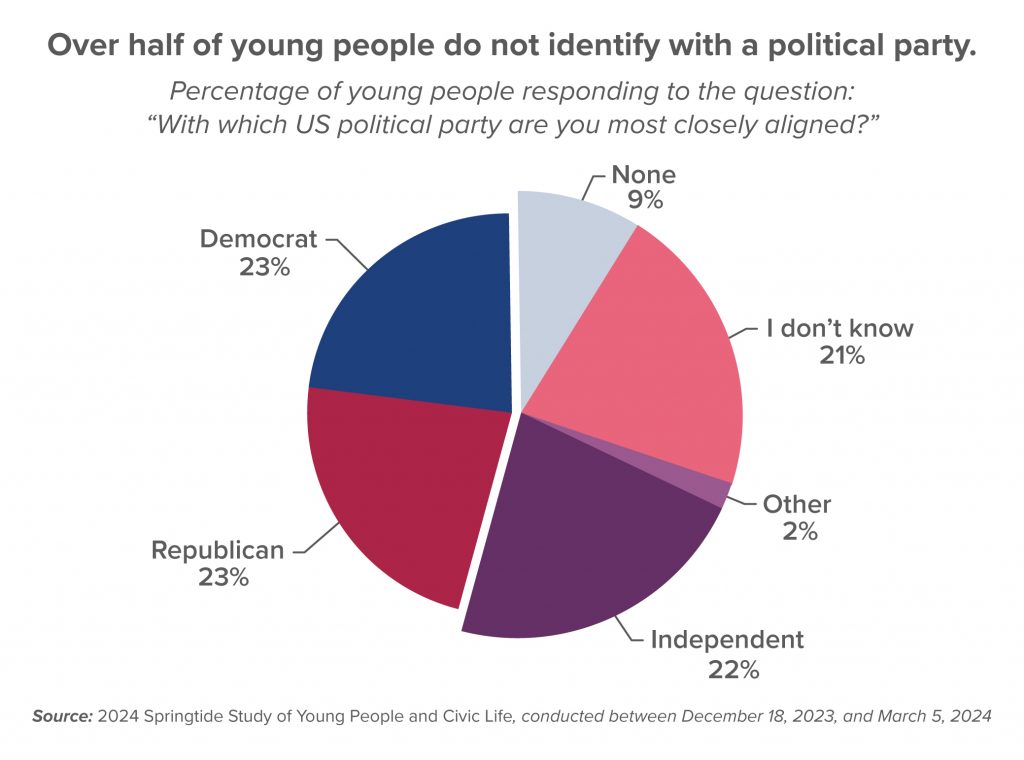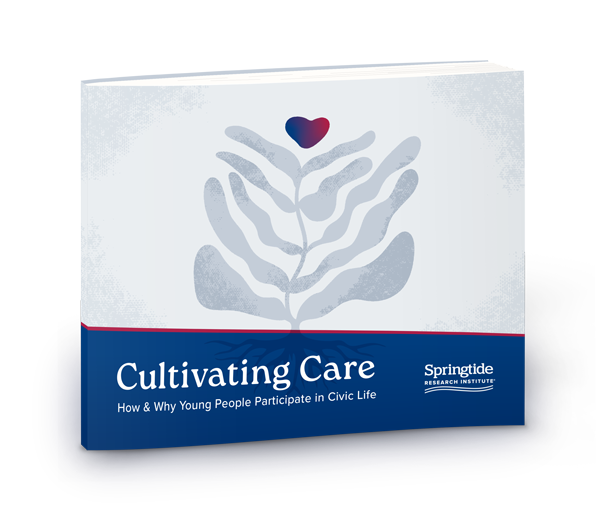Do young people care about politics?
Discover how and why young people participate in civic life
Members of Gen Z, born between 1996 and 2009, make up an increasing share of eligible voters in the United States. Together with an emerging Gen Alpha, born in or after 2010, young Americans are on the brink of shaping political systems and civic life in the United States for decades to come.
When we asked thousands of young people ages 13 to 25 to tell us about “politics,” we ended up hearing about care, not party allegiance. More than half of young people told us they do not identify with a major political party. Many don’t trust political institutions.
But yet they care—deeply—about issues like education, the economy, climate change, and more. Their core values, religion, and spirituality provide a framework for how to interpret social issues. Their relationships do, too.
Inside Cultivating Care: How & Why Young People Participate in Civic Life, you’ll find:
- New data on Gen Z and Gen Alpha’s party affiliation, political views, ideology, and the social issues that align with their core values
- Up-to-date research on how civic care arises at the intersection of religion and politics with statistics on Gen Z and Gen Alpha’s religious and spiritual affiliation, service attendance, and level of belief in a higher power
- Real quotes from young people ages 13 to 25 that illustrate the complex dynamics shaping their civic care
- Information on young people’s political engagement and awareness, including data on how many young people participate in volunteering, social media activism, and voting
- Insights on how to talk to young people about politics and how to cultivate care for shared communities
Is Gen Z Conservative? Are Young People Becoming More Liberal? Learn the real story.
Our data find that an equal amount (23%) of young people ages 13 to 25 identify as Republican or Democrat. More than half of young people do not identify with a major political party at all.

But Cultivating Care delivers more than just a snapshot of young people’s current political leaning.
We learned that members of Gen Z and Gen Alpha often avoid calling themselves political at all because they associate it with negativity in the media and in conversations.
Patterns of civic care develop long before a person can vote. Cultivating Care explores how emerging generations approach civic learning, the influence of moral and religious beliefs, perceptions of politicians and political systems, the relevance of political labels and social identities, relationships with peers and adults, and more. Discover how you can cultivate civic care and raise the next generation of civic-minded citizens.
Key Findings On Young People & Civic Care
- Young people’s civic identities do not align neatly with traditional political categories. More than half of Gen Z and Gen Alpha young people, ages 13 to 25, do not identify with either one of the two major political parties. Most prefer flexibility and issue-based engagement over strict partisan affiliation. Many young people feel jaded by political parties and politicians, seeing politics as performative and divisive.
- Young people report low levels of trust in political institutions. About a third of young people express distrust towards the US Presidency. A quarter distrust Congress, the Supreme Court, and the election system.
- Perceptions of partisanship and incivility prevent many young people from calling themselves political. Many young people do not consider politics an important part of their lives. Young people who identify as political tend to feel knowledgeable about social issues, hold an organized set of beliefs that help them make sense of these issues, engage in behaviors that support their beliefs, and see politics as relevant to their everyday lives.
- Despite distancing from politics, very few young people report not caring about any political issues. Members of Gen Z and Gen Alpha speak passionately and have strong views about social issues like education, the economy, abortion, and climate change. They explain how relationships, communities, personal experiences, and the media motivate and shape how they care for specific issues.
- Parents, teachers, and other trusted adults play a crucial role in cultivating young people’s civic care. Trusted intergenerational relationships are key to teaching young people to think critically, discuss difficult topics with integrity, and bridge connections to civic institutions. Negative experiences, such as feeling unheard or encountering closed-minded attitudes when talking politics, can discourage civic participation.
- Young people look both in and out of institutions to express their civic care publicly. Forms of engagement include civic learning, volunteering, online activism, civil discourse, and voting. Young people activate care within their own networks and communities while moving within complex social and political landscapes that feel farther outside their control.
- Few young people say that religion should have “a lot of influence” on politics in the US. More commonly, young people prefer that religion have “some” or “no” influence. Young Evangelicals are the most likely to say that religion should have “a lot” of influence. Non-religious young people are least likely to agree that religion should have “a lot” of influence. Compared to politics, young people are more than twice as likely to count religion among the most important things in their lives.
- Religious and spiritual beliefs shape young people’s own civic care. Young people are much more likely to report that their religion or spirituality shapes their politics than vice versa. Religion helps to motivate and interpret, clarifying for young people what to care about and how. Many reflect critically on how religious and spiritual beliefs intersect with political stances that might undermine freedoms.
-
For a good opportunity, feeling nervous or scared is okay.
Most 13-year-olds say that they will do something that makes them feel nervous or scared if it is for a good opportunity, rather than miss out.



